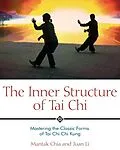Explores the deep, internal work necessary for the effective practice of tai chi
• Reveals the Taoist principles that gave birth to the Yang-style tai chi forms
• Shows how tai chi can circulate powerful healing energies through the body
Taoist adepts developed tai chi as both a martial art and a way to cultivate their physical body, energy body, and spirit body. Like all Taoist exercises, its main purpose is to form a connection to the basic energy that is the foundation of all life: chi. Until the beginning of the twentieth century, tai chi was considered a secret practice that was passed down only within a closely knit structure of family and loyal disciples. Despite its widespread growth in popularity as a martial art and health exercise, many of its underlying internal practices remain unknown.
The Inner Structure of Tai Chi explores the deep, internal work necessary for the effective practice of tai chi. Designed for practitioners at every level, the book contains step-by-step illustrated instructions for mastering the 13 forms of early Yang-style tai chi, also known as Tai Chi Chi Kung. The authors demonstrate the relationship of the inner structure of tai chi to the absorption, transformation, and circulation of the three forces that animate all life--the Universal force, the Cosmic force, and the Earth force--revealing the principles and practices necessary to receive the full spectrum of physical, psychological, and spiritual benefits that tai chi can bring.
Autorentext
A student of several Taoist masters, Mantak Chia founded the Healing Tao System in North America in 1979 and developed it worldwide as European Tao Yoga and Universal Healing Tao. He has taught and certified tens of thousands of students and instructors from all over the world and tours the United States annually, giving workshops and lectures. He is the director of the Tao Garden Health Spa and the Universal Healing Tao training center in northern Thailand and is the author of 50 books, including Taoist Foreplay, Inner Smile, Cosmic Fusion, Sexual Reflexology, and the bestselling The Multi-Orgasmic Man.
Inhalt
Acknowledgments
Putting Tai Chi Chi Kung into Practice
Foreword
Preface
Introduction
1 The Origins of Tai Chi Chi Kung
2 Why Practice Tai Chi Chi Kung?
3 Basic Principles of Tai Chi Chi Kung
4 Warm-Up Exercises and Preparation
5 Tai Chi Chi Kung Thirteen Movement Form
6 Sequence for Home Practice
7 Yin/Yang and Inner Smile Form
8 Rooting and Grounding: Connecting with the Earth
9 Transferring Chi Through the Body
10 Activating the Tendons
11 Tan Tien Form
12 Healing Form: Connecting the Organs with the Five Directions
13 Skin- and Bone-Breathing Form
14 Integrated Structure Form
15 Steel Wrapped in Cotton: Martial Arts Applications
16 Dance of the Tao
Appendix 1 Energetic Preparations for Tai Chi Chi Kung
Appendix 2 Tai Chi Physiology
Bibliography
About the Authors
The Universal Tao System and Training Center
